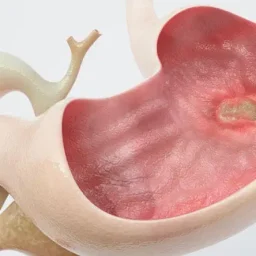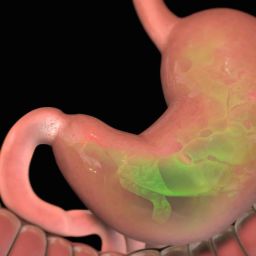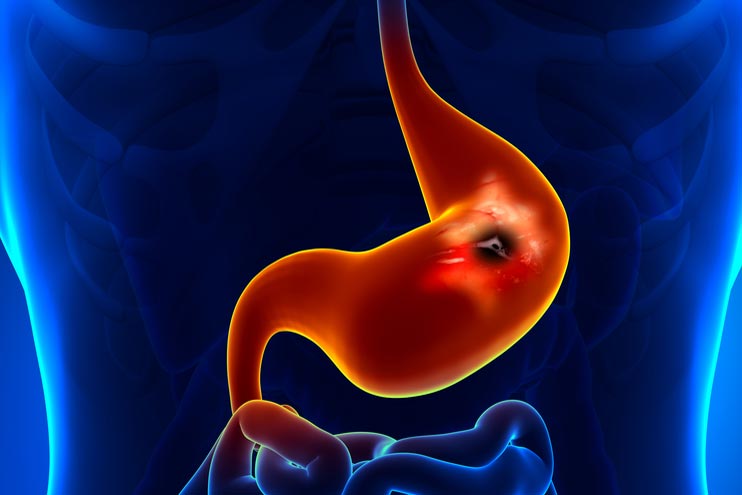
H. Pylori: A Major Factor in Both Ulcers and Stomach Cancer
The most prominent link between ulcers and stomach cancer lies in the presence of Helicobacter pylori infection. H. pylori is a bacterium known to cause chronic inflammation in the stomach lining, and it plays a pivotal role in both the development of ulcers and the increased risk of gastric cancer.
- Chronic Inflammation: The bacteria induce chronic gastritis, which leads to prolonged irritation of the stomach lining. Over time, this inflammation can cause damage to the gastric mucosa, which in turn may result in ulcer formation. If this infection remains untreated, the persistent irritation can further contribute to the development of more serious gastric conditions, including atrophic gastritis and even gastric cancer.
- Gastric Cancer Risk: While an ulcer alone doesn’t cause cancer, the presence of an untreated H. pylori infection over the long term can lead to changes in the stomach lining that increase the risk of developing cancer. The bacterium is thought to promote a sequence of cellular changes that lead to gastric atrophy, intestinal metaplasia, and eventually adenocarcinoma—the most common form of gastric cancer.
In fact, the World Health Organization has classified H. pylori as a group 1 carcinogen, meaning it is a known cause of cancer, specifically gastric cancer.
Risk Factors for Both Ulcers and Stomach Cancer
While H. pylori infection is a primary shared risk factor, other lifestyle and genetic factors also play a role in the development of both ulcers and gastric cancer:
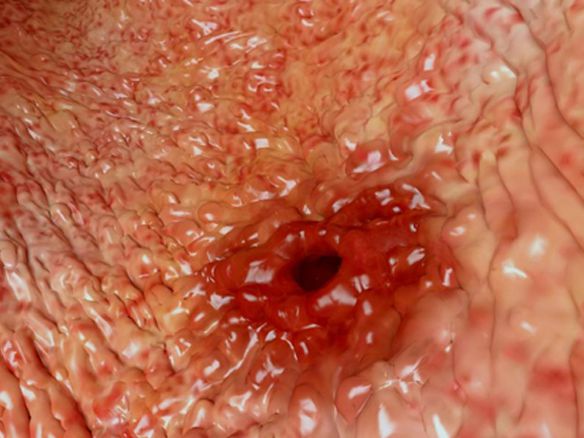
- Smoking: Cigarette smoke contains chemicals that can damage the stomach lining, impairing its ability to protect itself from stomach acid. Smoking is also associated with an increased risk of both peptic ulcers and stomach cancer, particularly in individuals with a history of H. pylori infection.
- Excessive Alcohol Use: Chronic alcohol consumption can irritate the stomach lining, leading to ulcers. Alcohol also increases stomach acid production, which exacerbates this irritation. Similar to smoking, excessive drinking has been linked to an increased risk of stomach cancer.
- Dietary Factors: A diet high in salty, pickled, or smoked foods and low in fresh fruits and vegetables may increase the risk of both peptic ulcers and stomach cancer. High salt intake is particularly concerning as it can contribute to the breakdown of the stomach lining, making it more susceptible to damage from acids and harmful bacteria.
- Genetic Predisposition: Family history and genetic factors also contribute to the risk of both ulcers and gastric cancer. Certain inherited conditions, such as Lynch syndrome and familial adenomatous polyposis (FAP), increase the likelihood of developing gastric cancer. Furthermore, individuals with a family history of ulcers may be at a heightened risk of developing both ulcers and cancer.
The Role of Chronic Gastritis in Cancer Development
Chronic gastritis, often resulting from a long-term H. pylori infection, is another critical factor in understanding the relationship between ulcers and stomach cancer. Chronic inflammation of the stomach lining can lead to changes that increase cancer risk.
- Atrophic Gastritis: This condition occurs when the stomach lining thins over time due to chronic inflammation, reducing the stomach’s ability to produce protective mucus. Atrophic gastritis is recognized as a precursor to stomach cancer, as the weakened lining can be more easily affected by cancer-causing agents.
- Intestinal Metaplasia: In some cases, the stomach lining may undergo a process called intestinal metaplasia, where the cells of the stomach lining transform into cells that resemble those found in the intestines. This transformation is considered an early step in the progression to gastric cancer.
The transition from chronic gastritis to gastric cancer typically occurs over many years, which is why early detection of inflammation or ulcers is essential for preventing the more severe outcomes.
Ulcers and Stomach Cancer: How Are They Linked?
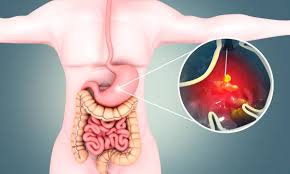
Although ulcers and stomach cancer share risk factors and may even co-occur in the same individual, it is important to emphasize that ulcers themselves do not directly cause stomach cancer. The connection between the two lies in the underlying causes and the role of chronic irritation of the stomach lining.
An ulcer, particularly a gastric ulcer, could be an indicator of ongoing damage to the stomach lining that could lead to cancer, but most ulcers do not progress to cancer. The risk of cancer increases when there are additional factors, such as untreated H. pylori infection, chronic gastritis, or genetic predisposition.
However, certain ulcers, particularly those that do not respond to treatment or those that recur frequently, may signal the presence of more serious conditions, including gastric cancer. In such cases, doctors may conduct additional tests such as endoscopy, biopsy, and imaging studies to rule out cancer.
How Ulcers Can Be an Early Warning Sign for Cancer
In some instances, ulcers that persist or do not heal with standard treatment might indicate a more serious condition. Ulcers are often treated with proton pump inhibitors (PPIs) and antibiotics, especially if H. pylori infection is present. If an ulcer does not respond to these treatments or if a person has a history of long-term symptoms, further diagnostic evaluation is needed to rule out stomach cancer.
- Gastric Cancer Diagnosis: The process of diagnosing gastric cancer involves a combination of tests, including endoscopy, where a camera is inserted into the stomach to visually inspect the lining. During this procedure, a biopsy may be taken to check for cancerous cells. Imaging tests such as CT scans or ultrasound may also be used to check for the spread of cancer to nearby lymph nodes or organs.
Doctors may also look for warning signs, such as unexplained weight loss, persistent nausea, and difficulty swallowing, as these can also be symptoms of gastric cancer. If any of these signs are present in conjunction with an ulcer, it becomes even more critical to conduct thorough investigations.
Prevention of Ulcers and Stomach Cancer
Given the shared risk factors between ulcers and stomach cancer, preventive strategies are important in reducing the risk of both conditions. Some of the most effective ways to reduce the risk of both ulcers and gastric cancer include:
- Eradicating H. pylori: The first step in reducing the risk of ulcers and gastric cancer is addressing H. pylori infection. If detected early, the infection can be treated with a combination of antibiotics and acid-reducing medications, significantly lowering the risk of complications.
- Lifestyle Changes: Quitting smoking, reducing alcohol intake, and maintaining a healthy weight can all help reduce the risk of both ulcers and stomach cancer. Healthy habits, such as regular exercise and a diet rich in fruits and vegetables, are essential for maintaining digestive health.
- Regular Monitoring: For individuals with a history of ulcers, H. pylori infection, or a family history of stomach cancer, regular medical checkups are essential. Screening tests, such as endoscopy, can help detect early signs of problems and allow for timely intervention.
- Dietary Modifications: A healthy diet is crucial for maintaining a well-functioning stomach lining. Avoiding excessive salt, processed foods, and alcohol can help reduce irritation of the stomach lining and decrease the risk of ulcers and cancer. A diet rich in antioxidants, vitamins, and fiber may provide additional protection.
- Stress Management: Chronic stress can exacerbate ulcers and other gastrointestinal issues. Managing stress through relaxation techniques such as yoga, mindfulness, and exercise can promote overall digestive health and reduce the likelihood of ulcer formation.
The relationship between ulcers and stomach cancer is complex, with overlapping risk factors, particularly H. pylori infection. While ulcers themselves do not directly cause cancer, the chronic inflammation caused by H. pylori infection can increase the risk of both ulcers and gastric cancer. Early detection and treatment of ulcers, particularly when caused by H. pylori, can significantly reduce the risk of developing stomach cancer.
Prevention and early intervention are key. Addressing risk factors such as H. pylori infection, smoking, alcohol use, and diet can help individuals reduce their risk of both ulcers and stomach cancer. Regular medical checkups and lifestyle modifications are critical for maintaining optimal gastrointestinal health and preventing the development of more serious conditions.

